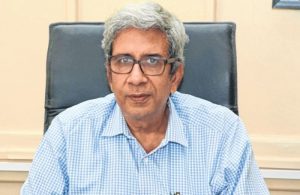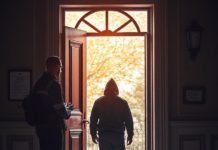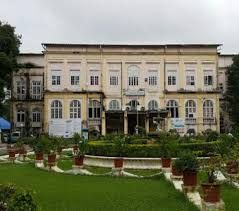https://www.freepressjournal.in/interviews/masina-hospital-on-right-path-to-regain-past-glory
Masina Hospital has a history that is amazing, and wants to make history again
February 25, 2019
 A century-old Masina Hospital, has a come a long way, both literally and in terms of services. From a primary healthcare provider to a tertiary care provider, the journey has not been an easy one. There were some hiccups like infrastructural challenges along with funding constraints. But now, the hospital is determined to restore its past glory and continue serving people at an affordable cost, says Dr. Vispi Jokhi, Medical Director at the hospital. In an exclusive interview with Jescilia Karayamparambil and R N Bhaskar, Jokhi further talks about the future activity of the Byculla-based hospital in detail.
A century-old Masina Hospital, has a come a long way, both literally and in terms of services. From a primary healthcare provider to a tertiary care provider, the journey has not been an easy one. There were some hiccups like infrastructural challenges along with funding constraints. But now, the hospital is determined to restore its past glory and continue serving people at an affordable cost, says Dr. Vispi Jokhi, Medical Director at the hospital. In an exclusive interview with Jescilia Karayamparambil and R N Bhaskar, Jokhi further talks about the future activity of the Byculla-based hospital in detail.
Where does Masina Hospital stand today?
Today, Masina Hospital is a 272-bed, multi-speciality hospital. Most hospitals like ours have become tertiary only in name. But we are on the right path to become a tertiary care hospital.
In order to become a tertiary care hospital, one needs to have advanced infrastructure. That is one of our biggest challenges.
There were some delays in achieving this, it was mainly due to lack of funds to support our infrastructure needs. The biggest advantage that we enjoy is the availability of space. So, our investment was largely to run the hospital and upgrade the equipment.
We work with a lot of partners for most of our tertiary care needs. Here we have adopted the strategy of outsourcing. Only after a thorough background check, we give these professionals an opportunity to run their business in our premises. We depend on them for our capital needs. This allows us to treat our patients at an affordable cost and also meet other capital requirements.
Our other source of income is donations. We are recipients of donation from various clubs and groups.
We do not offer free services as that is not affordable. But we offer subsidised rates and make services available in the most cost-effective manner. Unlike some hospitals, we do not have surcharges and have a insurance-policy-friendly approach.
What is the progress made in the restoration work?
We were always busy with operational activities. Hence we seldom thought about restoration. But recently, we got on board a conservation architect Vikas Dilawari to prepare a report for us and he gave us a comprehensive report. If his recommendations are carried out, it will help us restore the building to its old glory.
The board of trustees will form a Masina Restoration committee. As soon as the experts for the committee are selected, this plan will gain momentum. We have invited experts, philanthropists, Jews from around the world that have interest in David Sassoon’s old estates and also members from David Sassoon’s family.
Between 2011 and 2013, we have worked with various professional agencies who generated many reports. Despite having a blue print, we could not implement the reports as we did not have enough resources.
What is the other revenue model Masina Hospital is exploring?
It is a known fact that Apollo has been showing an interest in this property for a long time. We do believe that the asset of land can be used effectively by giving it to a corporate hospital.
At the same time, we are very careful about going ahead with such an arrangement, because we don’t want that hospital to dwarf our hospital and prevent us from growing. As a corporate entity, we do want them to compete. At the same time, we do not want any compromises on the quality of medicare offered.
How much has the hospital invested in recent years?
At any given point of time, there are projects worth a few crores that are being executed.
At the moment, we are about to implement a plan to upgrade the hospital. We are developing a new casuality department, new cosmetic laser surgery department, endoscopy department, and orthopaedic operation theatre among other things. We are upgrading our Burns’ Intensive Care Unit (ICU) and Neonatal Intensive Care Unit (NICU).
What is the occupancy rate of the hospital?
Other hospitals have been harping on occupancy, but we do not. The average length of stay in our hospital is reducing. However, the turnover of the hospital has improved. In our hospital, the figure gets skewed because of two departments—burns department and psychiatric department, as patients in these departments end up staying for longer periods.
Tell us about your psychiatric department?
We are the only facility in this area that has an indoor, protected psychiatric department. After the Mental Health Care Act directive, we took control of this department. Now, we have made it a full-time department with full-time doctors and counsellors, unlike in the past. We have a team of five-six counsellors. We have an occupation therapy department. We have various people coming for some extra therapy like yoga, dance, animal-assisted therapy and art-based therapy.
In next six-eight months, there will be a complete revamp of the mental health department. We are approaching a lot of philanthropists for the same.
Which aspect of insurance makes you unhappy?
We have tied-up with many insurance agencies and we have given many patients the cashless services that insurance companies talk about. The amount of work in the hospital has increased due to this.
We try to negotiate as much as we can but many of our medical consultants [doctors who come to the hospital on a consultancy basis] find the fees paid through insurance companies quite low. As a result, many consultants have opted to leave us for better paying hospitals.
We are quite happy with insurance in its present form. In psychiatry, there are problems though. The government has been saying that mental illness should be covered under health insurance but no regulations or guidelines have been put in place for this. We think that this should be done quickly, as insurance cover for psychiatry will allow more people to use this service.
IRDA [Insurance Regulatory and Development Authority] has stated that psychiatry should come under the ambit of insurance, but there are some grey area relating to this branch of medicines.
How do you view Ayushman Bharat?
We have been watching this scheme very closely. We see the rates provided under the scheme as a big problem. The rates are unrealistic. Moreover, the government talks about the indigent patients’ policies. If hospitals like ours are required to take up this burden as well, along with Ayushman Bharat, we would be out of business. This is what could happen if it makes compulsory the empanelment of all bhospitals under Ayushman Bharat. It will be a recipe for disaster. Yet another problem here, is the possible misuse of this system.
In fact, we are already pro-indigent people. We charge around 30-40 per cent less for any type of treatment compared to other hospitals in this area. Most of our beds are in the general ward category.
What are the other activities that the hospital is doing?
Apart from improving the quality of our staff, we are planning to skill other youth as well. We are developing a course more along the lines of vocational training. At present, we need to develop a protocol for this training and we are doing this with the help of Australia-based My Flex Health International. This will not just be a way to build manpower for us but also skill the youth to work in India and abroad. The course will be recognised by other countries too.
We are in talks with the state government to fund this course.
Does Masina plan to expand into homecare services?
I feel very dearly about this concept. But one needs to put in a lot of time for home care services. I have not been able to dedicate that much time to develop this service as I usually get caught up in other activities. But I hope to develop this space.








































COMMENTS